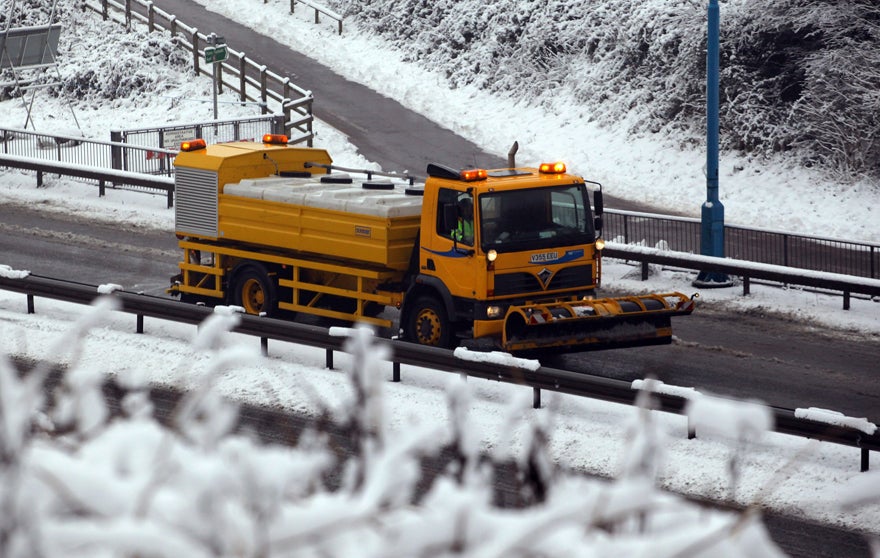Councils urged to increase road salt stocks

Councils should look to increase their stocks of road salt to combat severe winter weather, a Whitehall-commissioned review said today.
The current benchmark for local highway authorities is enough salt for four gritter runs a day for six days.
In the medium term councils, where they can, should increase stocks so they can make 48 gritter runs, a winter resilience review final report today.
Led by RAC Foundation chairman David Quarmby, the review team made 11 recommendations today to add to the 17 made in an interim report in July 2010.
The review team, set up following the worst winter for 30 years in 2009/10, said the economic and social cost of winter weather disruption in England was around £1 billion.
The review, which looked at the way transport systems coped with the last two winters, recommended:
* Local councils should collaborate on stocks where it makes sense to do so;
* More economical use be made of salt (which needs technical research to be completed), as experience last winter showed that lower rates of spread did not appear to reduce effectiveness in making roads safe;
* Greater flexibility of output by the two British salt suppliers;
* Regular national monitoring to help ensure adequate salt stocks are in the right places;
* On the railways, there should be more consistent use of contingency timetables, selective heating of conductor rails south of the Thames and greater use of de-icing trains;
* The rail industry should work closely with local highway authorities regarding responsibilities for de-icing key areas used by travellers;
* Better liaison between airports and local highway authorities in some areas is needed regarding the gritting of critical roads around airports;
The review team said that July's recommendation for the Government to import a quarter of a million tonnes of salt as a strategic reserve for next winter had been accepted.
Shipments had already started to arrive, with the majority of the salt expected to arrive in November.
The review team said that de-icing products for aircraft and for runways and taxiways had been in very short supply, but the industry was ensuring adequate resilience for the future.
Mr Quarmby said: "The weather of the last two winters was exceptionally severe, yet in most respects local authorities and the transport industry rose to the massive challenge.
"In 2009/10 in particular - the most severe winter for 30 years - transport networks across the country were disrupted. But recovery - particularly on the trunk road network, the national rail routes and aviation routes - was relatively swift."
He went on: "However, there are still lessons to be learned and improvements to be made. The salt supply chain for highway authorities must be made more resilient, with local authorities increasing their precautionary salt stocks and suppliers responding more flexibly to demand, and the rail industry can further enhance its service reliability in bad weather."
He said it was vital that all highway authorities and transport operators co-operated in planning for severe weather, so that there was "a cohesive transport system for the public even if it is a reduced one".
They must also combat severe weather by fully using the "latest technologies and media to keep road and transport users well informed with timely and accurate information".
Mr Quarmby welcomed today's publication by the Government of a "snow code" to guide the public on clearing footpaths and guard them against negligence claims.
Responding to the review in a written Parliamentary statement today, Transport Secretary Philip Hammond said: "Much action has already been taken by local and national highway authorities, salt suppliers, the Government and others to help keep our road network moving in the event of snow and ice this winter.
"But as the previous two winters have shown, we cannot be complacent."
He added that the Highways Agency had made arrangements for the import of 250,000 tonnes of salt which was expected to start arriving this month.
Mr Hammond said that the Department for Transport had already been monitoring the national salt stock position in the run up to winter.
From the end of this month, guidance to local highway authorities would be available to "help to ensure that salt is spread at appropriate and effective levels, but not overspread, thereby helping to conserve stock as well as reducing costs to local highway authorities".
Mr Hammond said he agreed with the review team's recommendations for rail and aviation and he also backed the call for greater communication to the travelling public during severe weather.
Join our commenting forum
Join thought-provoking conversations, follow other Independent readers and see their replies
Comments